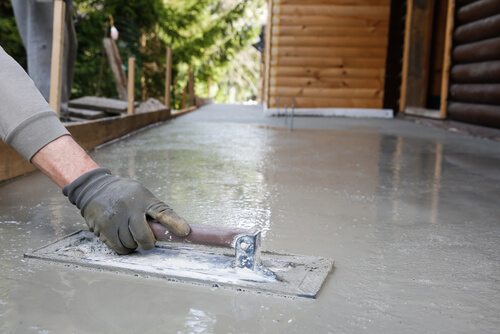New concrete will provide your home with an aesthetic upgrade and an investment that should pay off for years. Concrete is durable but may get damaged during winter if you don’t offer it proper maintenance. Winter is known for frequent snowstorms, often resulting in concrete cracks and other damages. Here are some tips for maintaining new concrete during its first winter.
Don’t Use Hazardous Deicing Agents in Concrete Maintenance

Occasionally, you might think to clean your concrete driveways by sprinkling them with rock salt or applying deicing agents following snow accumulation throughout the winter. Nevertheless, avoid deicing agents that contain the following chemicals:
- Magnesium chloride
- Ammonium sulfate
- Ammonium nitrate
These deicing agents will eat away the concrete, eventually causing it to crack, rust, or even crumble away. Furthermore, the chemicals make the freeze-thaw cycle occur quicker and less natural than it would if left to nature’s course. Try placing dry sand on the surface to add grip and let you walk safely without worrying about sliding.
Avoid Heavy Traffic in Winter to Hasten the Curing Process
Concrete takes a long time to cure and harden. Maintenance involves giving it time to dry before exposing it to traffic. That can take several months, depending on the temperature and humidity in your area.
It would be good to wait until the winter freeze-thaw cycle is over before using your concrete surface for parking purposes. When you subject your concrete to deicers or saltwater leaking from vehicles in winter, there’s a greater chance that the surface will weaken and that scaling will occur.
Exercise Care When Shoveling
Be careful not to chip or dent your concrete when shoveling snow during the winter. If you want to solve that problem, it’s advisable to use a rubber or vinyl-edged shovel rather than a metallic one. As part of routine maintenance, always ensure your new concrete is free of glaciers.
During the winter freeze-thaw cycle, newly laid concrete can suffer significant damage if you allow snow and ice to remain on the surface for longer periods. If you know you won’t have time to shovel the snow from your concrete surfaces immediately, you may want to hire a snow removal contractor to do the maintenance work for you.
Seal Your Concrete to Protect it From Winter Moisture Damage
Concrete is porous, which means it absorbs moisture from the ground below. Because there is excess moisture in the ground during winter, it can leach up into the concrete’s surface, causing discoloration.
A proper maintenance measure to prevent snow damage would be using a quality concrete sealer to reduce the amount of water that can seep into the concrete’s openings. The chemicals build a protective layer on a concrete’s surface as they seep into the material.
Before applying sealer to your concrete sidewalk, you must ensure it’s dry. After that, use a paintbrush or pump sprayer to spread a uniform layer of the sealer over the whole surface. Always read the label carefully and follow all instructions precisely when applying maintenance chemicals.
Reroute Home Drainage Downspouts
Examining a property’s downspout drains is one of the less popular maintenance strategies for reducing the amount of moisture that accumulates on new concrete during the winter. It’s possible to steer the winter snow from the roof onto the pavement or another concrete surface. Adjust the drain placement, so it directs water away from the concrete. Ensure the downspout drains water at least five feet from your concrete driveway to avoid further damage. Consider digging a shallow trench that leads to an underground drain.
Fix the Cracks in the Concrete and Observe Regular Maintenance
Fixing cracks as soon as they emerge is an ideal way to prolong your new concrete’s lifespan. If you see a crack forming, get in touch with a contractor to have them correct the issue as quickly as possible. The more you delay the repair, the more snow will seep into the concrete.
Wrapping Up

To ensure that your new concrete remains in good condition throughout the year, you must be familiar with winter concrete care to prevent damage during the freeze-thaw cycle. We hope you’ll find this guide helpful in understanding how to maintain your concrete before the cold weather sets in.
Are you looking for a reliable firm to assist you with broken concrete maintenance due to the winter weather? You can request a quote before scheduling an appointment with our well-trained staff. Contact our team today for further details.





